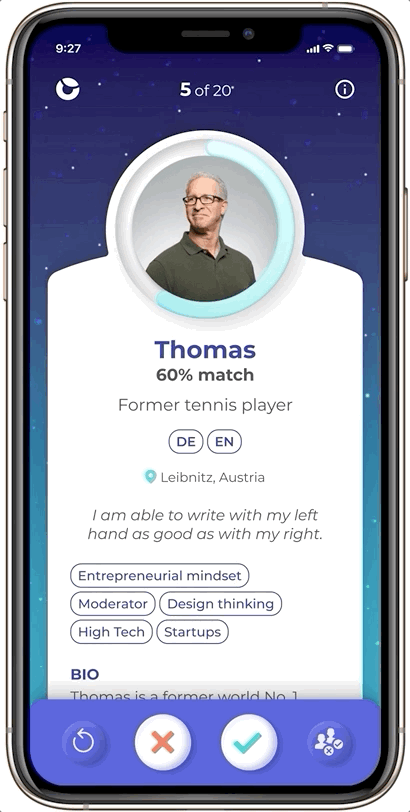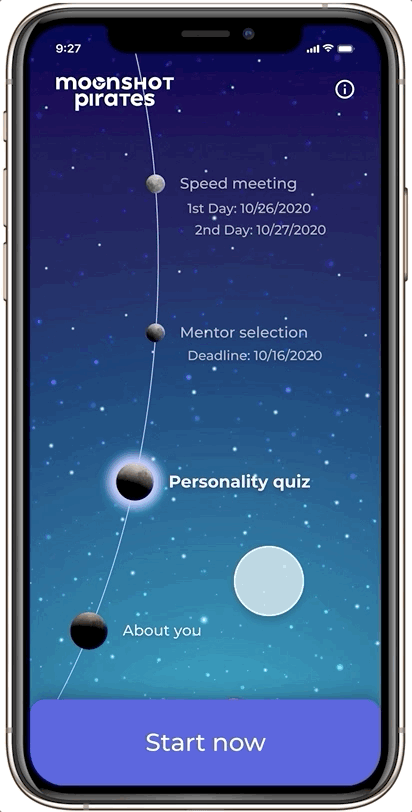Moonshot Pirates
Mentorship Application

Context
Moonshot Pirates want to encourage young people from 15-19 years (Generation Z born 1995-2005) to think big. Therefore they organize bootcamps where the participants learn how to transform their world changing ideas into real projects.
After the bootcamp they had no tool to maintain the "pirates" and support their entrepreneurial being. On the other hand they wanted to connect young likeminded young people from all over the world.
So the idea of a mentorship app was born.
This app should cover all the requirements mentioned before.
Duration
8 weeks
4 hours/day
Role
Research
Ideation
Usability testing
Low-fi/hi-fi UI
Team
4 people in total
UX bootcamp colleagues
Tools
Miro
Figma
Photoshop
Indesign
Draw.io
Problem
To create an app, that fits both target groups (Mentors & Mentees). It was also required to include gamification. So on the one hand it should be serious and on the other hand it should be fun to take "pressure" away. In addition we had to be careful to not look like the dating apps we all know, because this would transmit a completely wrong picture.
Goal
To create an mentorship App to empower young people from 14-19 years old (Generation Z) from all over the world to connect, learn and contribute to global challenges by having a mentor in the field of their interest. This app should not transfer the feeling of learning, but the feeling of having fun by doing something meaningful.
Research
We conducted several ways of research, at the beginning our focus was on diving into this topic to understand the Moonshot Pirates and the target group as good as possible. Therefore we started with a competitor, market and a target group analyse. Afterwards we interviewed potential Mentees and people who are already in a mentorship program. It was important to find out which behavior and motivation the mentees have, to understand their pain points and to test our assumptions.
Research Highlights
Competitor
We found out that our main competitors are: Female Factor, MicroMentor and Groth Mentor. They all were web based, but had the largest reach. Mentorship Apps as MentorcliQ, Mentornity and Mentor City exist, but are not very popular so far. Therefore we did a more accurate research fot the ones with a large reach. To illustrate this we put pur findings in a chart and also made an estimation for the Moonshot Pirate app.


Market
Generation Z, born 1995-2005:
-worldwide buying power of $44 Bill
-Expands to $600 Bill when considering the influence they have on their parents’ spending
-About 22 % of the population are in the age segment of Genration Z
- 22,5 Mio in Europe
- 450.000 in Austria
Target group Interviews
Mentees
- gamification should be included from the beginning
- communication mainly online
- used to be protected & spoiled resultation: high need for security
- set of values: realizing one's own interests, having fun and a profession that fulfills them
3 interviews
38 surveys
4 different countries
age 13-21
They want to hear how mentors become successful and how they find out what they want to do in life.

"Application process needs to be efficient, easy and fun"
85% were open to talk about their future with an expert that they personally don`t know
"Good mentor/mentee match is crucial for the successful mentoring"
Mentors
-they want to have networking events with other mentors, so they can learn from each other
-a short guidance is also important for them, specially if they do to for the first time
-don't want to have more than 4 mentees at the same time
"Good mentor/mentee match is crucial for the successful mentoring"
Understand user
After following up with the research highlights we did some rounds of brainstorming. To understand the users even better we created two Personas, one for a mentee and one for a mentor.
We also made a value proposition canvas and customer journey map for the mentee persona to illustrate all the steps a mentee is going through.
The rough concept was born. We decided to focus on the
application process, because this is the foundation and first step for a successful mentorship.

First concept
With the focus on as much gamification as possible on the mentee side we decided for these features:
-a funny personality test
-swiping through mentors with same interests and professions
-speed meting via time limited video call to get to know you potential mentor


Application form for basic data:
name, E-Mail, age, language, areas of interest
Personality test:
e.g.
What's your superpower?
Choose mentors by “swiping”
First suggestions from Algorithm & filter results
Online “Speed meeting”
notification informing about personal mentor
Prototyping
Before we started prototyping, we made a mood board on Miro to get so ideas. Our first low-fi prototypes we did with pen&paper. After testing we improved some things and did a low-fi prototype with Figma, did a usability test again and created a high-fi interactive prototype with Figma.






Testing
As you know, usability testing is a repetitiv process, but we can say, the main rounds of testing we did after having a paper & pen prototype and after having a clickable high-fi prototype. In between we conducted several small tests to test specific features. The tests we did were in person or via video call.

Usability test interactive prototype
-3 teenager
-average age 17,3
-via zoom


Testing takeaway
-mentees like the idea of personal stuff in the BIO, because they want to have a personal connection with the mentor
-they really like the swiping part, it reminds them of other apps they are using
-the order of the mentors has no impact on the decision they are making
-66% asked if they can do the personality test and to get to know something about themself (as it was not part of the usability test)
"I like the little sentences that tells me a little bit more about them, it just makes them more human”
Girl, 16 years old
“Swiping the mentor, that sounds quite fun, because one of the apps I use, it is called Quzzled...”
Girl, 19 years old
Design Solution
Design wise we decided to keep the "space design" from the Moonshot Pirates. We tested a lot the bottom bar and icons and decided for the following bottom bar..
Swiping


Personality test
We decided for a "real" picture of the Mentor and not for an avatar. First we thought it will not make an impact, but after testing, the participants communicated, that it is very important for them to get a personal connection and feeling, already during the application process.
We also included a lot features the generations are used to, e.g.: the left and right swiping option. Gamification is also implemented through the whole process, for example in the personality test with uncommon questions.
Reflection
📈 developed a process for efficient match of mentees AND mentors
📈 we included gamification from the beginning
📈 detailed application process but still easy and fun from the beginning
💡 enough time for testing is important for a successful product
💡 constant communication/workshop with stakeholder saves time and improve success rate of final product
💡 working in a group increases the quality
